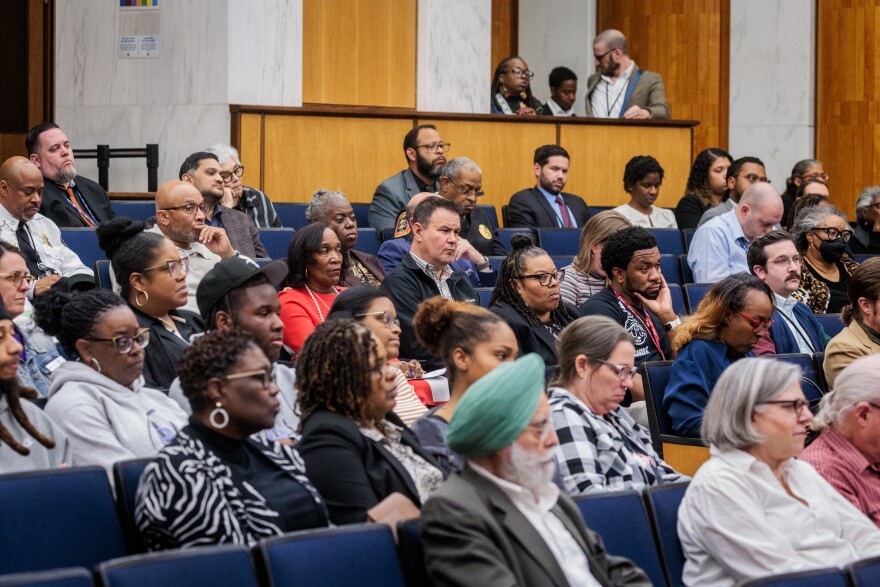Richmond Mayor Danny Avula shared his first city budget proposal Thursday, a $3 billion spending plan that he said prioritizes needed investments and makes cuts amid ongoing funding concerns.
Avula said his budget for fiscal year 2026, which starts July 1 and runs until June 30, 2026, will allow salary increases for city workers and money for child care, housing and environmental projects.
It also cuts into available funding for nonprofits and doesn’t give schools as much as the district hoped.
Avula’s budget also doesn’t have direct funding for the Richmond People’s Budget, a participatory budgeting pilot where the city collected nearly 2,000 funding ideas from residents. Voting on the RPB is set for April 1 through 15.
The mayor said the city is “absolutely committed to the concept,” and to finding money through the Department of Public Works budget to support several of the environmental projects expected from the ongoing process.
“We are moving towards our vision of a healthy and thriving city with abundant opportunity, where everyone's rights are protected and where no one is left behind, and an effective city government that stewards resources, meets community needs and earns the trust of its residents,” he said at Thursday’s presentation.
The mayor highlighted that his proposal doesn’t include a real property tax increase, but it would lead to an average utility tax hike of $12.83 per month for city residents.
The mayor’s budget now moves forward to the Richmond City Council, which will hear from the public and consider changes before a final spending plan is approved; that’s currently scheduled to happen in May. (Virginia’s fiscal year runs July 1–June 30.)
Workforce spending: $18.6 million
Avula’s proposal provides for investments in pay increases laid out in the city’s collective bargaining agreements.
This includes 3.25% salary increases for eligible general employees and money to give city police officers and firefighters an average of 10.3% pay hikes.
The mayor’s plan for the Richmond Police Department removes 59 vacant officer positions carried from the last fiscal year. According to the proposal, Richmond is “unable to fill” the allotted position level.

$249 million for RPS: more than last year — but not all it wanted
The mayor’s budget allocates a $9.6 million increase over fiscal 2025 to the city’s school system — but falls approximately $20 million short of the $270.1 million the Richmond School Board requested.
After Avula unveiled his proposal, Superintendent Jason Kamras and the School Board said in a joint statement they understand the city faces a difficult budget year and appreciate the additional funding “in a time when many departments and partners face cuts.”
“However, right now, it falls short of what our children need — and deserve,” Kamras and the board added. “It jeopardizes the progress we’ve made, and our children’s future.”
Richmond Public School officials approved the fiscal year 2026 operating budget of $546.8 million earlier this month. Funding for the city schools budget comes from two sources: the state and the city.
Over the last few years, the city’s contributions have increased. RPS received over $200 million in FY23, $221 million in FY24 and $239 million in FY25.
RPS’ total FY26 budget request represented an increase of $30.8 million over FY25. The district originally planned to ask the city for an additional $43.7 million, but later reduced it.
Kamras and the board said the additional $30 million is needed to start addressing the district’s five Dreams4RPS strategic priorities: academics, talent, wellness, engagement and operations.
Talent will receive the highest budget investment at $16.5 million, in order to honor the school division’s collective bargaining agreements.
City councilors must adopt the schools’ appropriation by legal ordinance on or before May 15. After this, the school board will make adjustments to balance the budget before voting on it in June.
The mayor also proposes $500,000 for Richmond’s early childhood care and education trust fund and $520,000 for the family crisis fund, both of which are run by nonprofits.
Budget decisions in the face of challenges
Avula expressed optimism for the city’s future, but told councilors that his administration experienced challenges during the budget process to develop a balanced spending plan.
This includes a $50 million gap between projected revenues and expenses as recently as February 2025.
The mayor also noted that Richmond’s aging infrastructure is in need of upgrades — and that the city can’t collect revenues from valuable tax-exempt property owned by the state or federal government. He said the city misses out on about $63 million per year because of it.
“Our budget is always limited by the city's geographic and historic challenges, but this year, we are building the budget at a time when we as a city face rising costs and there's a very uncertain federal landscape,” Avula said during his prepared remarks.
To help address funding concerns, Avula’s budget includes reductions of $10.6 million. The mayor also proposed a $4.1 million decrease in money available for nonprofits from last year’s budget, which allocated $13.4 million for such organizations in FY25.
Richmond is “extremely constrained” in its ability to expand its real estate tax base, he told councilors, and property taxes are the city’s single largest source of revenue.

Utility rate increases
Under Avula’s plan, the rates would go up for residents’ water, wastewater, gas and stormwater bills through the Department of Public Utilities.
Gas bills would see the largest increase, going up $4.88 per month on average. Residents would pay $4.55 more a month for wastewater, on average, according to the proposal.
Here are the proposed average utility rate increases under Avula’s FY26 budget:
- Gas: $4.88 per month
- Wastewater: $4.55 per month
- Water: $2.36 per month
- Stormwater: $1.04 per month
The utility rate increases were proposed before the city’s water crisis in January.
Avula said the city’s five-year capital improvement program has more than $60 million, including $38 million in FY26, to fund improvements for the city’s water treatment plant, water distribution and transmission systems.
Housing: nearly $50 million
Avula’s budget investment for housing in the city includes $10 million for the city’s Affordable Housing Trust Fund.
The mayor also allocated $800,000 for Richmond’s eviction diversion program and $500,000 for services to help prevent evictions, such as legal and mediation support.
An additional $7.9 million is planned for the Creighton Court redevelopment project, which is led by the Richmond Redevelopment and Housing Authority and expected to bring 246 affordable housing units.
$48 million for other major projects
The mayor’s first budget also includes:
- $21 million for the city’s initiatives to have make street improvements and upgrades — including sidewalks, bike lanes and transit stops
- $11 million for the Fall Line Trail
- $10.1 million for a multi-use cultural and heritage campus in Shockoe Bottom
- $6 million for Brown’s Island improvements
What’s next?
Council’s budget review now begins; amendments are expected to be finalized within weeks.
Throughout April, the council will have work sessions to review Avula’s plan, consider changes and hold public hearings. On April 7, Avula’s administration is set to present proposals in the operating budget and take questions from the council.
Council’s amendments to Avula’s budget must be finalized and sent to the city attorney by April 21, council staff said after Thursday’s presentation. Councilors will hear from the public on their budget amendments after they are announced on April 28.
The final budget is expected to be voted on during the May 12 Richmond City Council meeting.























